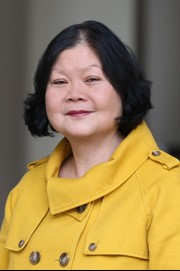Speaker Spotlights: Carolyn Y. Woo
By | Fall 2015
Carolyn Y. Woo, President and CEO, Catholic Relief Services

In mid-June, Carolyn Woo was in Rome, invited by the Vatican to participate in the formal launch of Pope Francis’ encyclical on climate change. Woo, the former dean of the Mendoza College of Business, was charged with presenting the views of the business community. “I was deeply touched,” Woo said. “I felt like my whole life’s work — I don’t know how it all added up — but somehow, when it converges at the Vatican, on the deepest issue we face as a human race, and both the care of the Earth and the care of the poor, I just felt the grace of God.”
She went on, “Everyone has a role in the problem, and everyone has a role in the solution. Business, clearly, has a very significant role in terms of the ability to do good and the ability to do harm. The encyclical makes the issue a relevant one, an urgent one, a moral one, and an issue of faith.”
How optimistic is she that business can be a force for good? “Where I see more resistance is government. We actually need more assistance from government in terms of two things: How do we handle carbon disclosure and carbon pricing? Once you have that, it gives numbers, it gives a set of rules to move the system forward. I think many businesses recognize these issues because it creates risk for them. They recognize many different types of opportunities that could help them by reducing carbon and, in many cases, reducing costs. Overall, as you actually listen to business, they are asking for some sort of common set of rules so that it could level the playing ground.”
Woo is the conference’s closing keynote speaker. What does she want participants to think about as they leave? On climate change, she said, her message has three takeaways: It is a responsibility, it is an opportunity, and it is a matter of the heart. With that, she returned to the message of Pope Francis’ climate change missive. “When the pope says this is a conversion, what he is calling for is a very different way to look at our relationships, our relationship to the Earth, our relationship to others, particularly the question of what do we take away and what do we give back.”

Comments